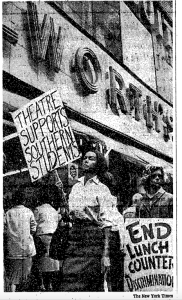It all started in 1960. On February 1, four black college students sat at the lunch counter of a Woolworth’s store in North Carolina, “where the official policy was to refuse service to anyone but whites,” explains history.com.
They weren’t served, of course. But their sit-in sparked a movement. Thanks to national TV coverage, segregation foes showed their support by picketing Woolworth stores around the country.
 That included stores in New York City. Segregation was not legal here, of course.
That included stores in New York City. Segregation was not legal here, of course.
But that didn’t stop protesters from gathering at more than 100 Woolworths across the city to urge support for the North Carolina students and call for the end of the South’s Jim Crow laws.
The New York–based Congress of Racial Equality “mounted a 30-member picket line in front of the F.W. Woolworth & Co. store at 208 West 125th Street,” (above) reported the New York Times on February 14.
Picketers continued demonstrating through the spring. On April 3, while 100 people protested outside the store, 30 young adults held a sit-in at a Woolworth’s counter on 34th Street near Seventh Avenue.
 “The sit-down demonstrators at the Herald Square store, Negro and white, included two clergymen,” continued the Times. “They ordered no food, but sat at the counter near the 33rd Street entrance, reading newspapers and doing crossword puzzles.”
“The sit-down demonstrators at the Herald Square store, Negro and white, included two clergymen,” continued the Times. “They ordered no food, but sat at the counter near the 33rd Street entrance, reading newspapers and doing crossword puzzles.”
“Neither the store’s personnel nor the police tried to oust them. They soon dispersed.” More protests, like this one at a Woolworth’s in Times Square, followed.
Officially, lunch counters in the South desegregated that summer.
[Top photo: Getty Images; second and third images: New York Times]
Tags: 1960s protests in New York City, racial equality NYC, where was Woolworth's in New York, Woolworth sit-in 1960 Herald Sqaure, Woolworth stores New York City

July 28, 2016 at 11:35 pm |
It’s nice to read about fine citizens standing up the hate and discrimination of the Democratic party.
Fun fact: The Democratic party had the longest serving Klansman in history in office. Hillary even had high praise for Robert Byrd.
Remember that the next time you pull a (D) lever.
July 29, 2016 at 4:01 pm |
Really, corpse eater!?!? What are u saying? That Hillary is a racist? Wtf? Go to the Trump site and stay there a#@ hole
July 30, 2016 at 12:26 pm |
After the 1965 Civil Rights Act was passed into law, all the racists that were in the Democratic Party switched to the Republican, and that’s been their home ever since. Robert Byrd has reformed his stance in the 1970s and spent the last decades of his tenure in office making up for his old ways. Don’t play fast and loose with the facts.
Besides, this article is about the protests at Woolworth’s to protest discrimination. Acts of peaceful marches and civil disobedience went a long way to help booster support for desegregation and allow for the Civil Rights Acts and the Voters Rights Act.
July 30, 2016 at 10:49 am |
“It all started in 1960” is debatable. By that time there had already been several sit-ins protesting racial segregation in cities such as Baltimore (1955), Durham (1957), Witchita (1958), and OKC (1958),
July 30, 2016 at 12:30 pm |
True, but 1960 is the year the sit down protests gained momentum and captured the people’s attention nationwide.
April 14, 2017 at 9:56 am |
[…] the individuals involved. A year or so later I came closer when pickets were marching outside the Woolworth’s on 14th Street. In the Southern U.S., Woolworth’s, known for segregated lunch counters, was the […]
January 4, 2019 at 7:45 pm |
[…] X speak on campus. On weekends, with a handful of other black students, she marched in front of an F. W. Woolworth & Co. store in Manhattan in solidarity with blacks who had staged a sit-in at an all-white Woolworth lunch […]
January 4, 2019 at 8:47 pm |
[…] X speak on campus. On weekends, with a handful of other black students, she marched in front of an F. W. Woolworth & Co. store in Manhattan in solidarity with blacks who had staged a sit-in at an all-white Woolworth lunch […]
January 5, 2019 at 12:25 am |
[…] X speak on campus. On weekends, with a handful of other black students, she marched in front of an F. W. Woolworth & Co. store in Manhattan in solidarity with blacks who had staged a sit-in at an all-white Woolworth lunch […]
January 5, 2019 at 5:02 am |
[…] X speak on campus. On weekends, with a handful of other black students, she marched in front of an F. W. Woolworth & Co. store in Manhattan in solidarity with blacks who had staged a sit-in at an all-white Woolworth lunch […]
June 14, 2021 at 1:04 am |
[…] was once a regular shopping stop for all kinds of necessities; in New York City, they even played a role in the Civil Rights movement of the 1960s. Yet in it’s final decades, the store came off as shabby and […]